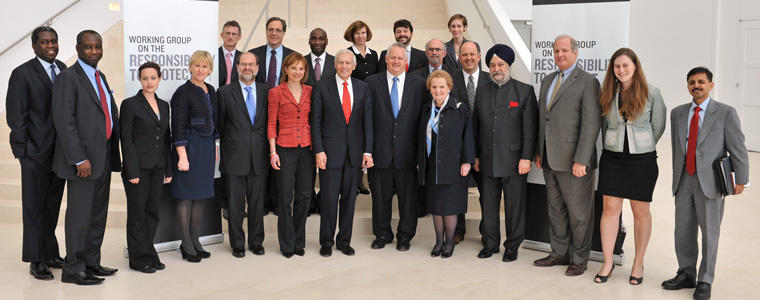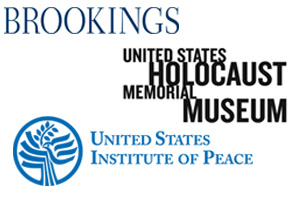The Responsibility to Protect (R2P) working group sought to increase understanding of R2P and identify concrete steps to bolster the political will of U.S. decision-makers to respond in a timely manner to threats of genocide, crimes against humanity and other mass atrocities in this emerging national norm. This project became inactive on July 23, 2013. The text below is for archival purposes.

About the Working Group
 The Working Group on the Responsibility to Protect (R2P) is a joint effort by the United States Institute of Peace, the United States Holocaust Memorial Museum, and the Brookings Institution. Former Secretary of State Madeleine Albright and former Presidential Special Envoy to Sudan Richard Williamson co-chair the working group, which includes former U.S. government officials, academics, foreign policy experts, political consultants and media professionals. The Working Group aims to:
The Working Group on the Responsibility to Protect (R2P) is a joint effort by the United States Institute of Peace, the United States Holocaust Memorial Museum, and the Brookings Institution. Former Secretary of State Madeleine Albright and former Presidential Special Envoy to Sudan Richard Williamson co-chair the working group, which includes former U.S. government officials, academics, foreign policy experts, political consultants and media professionals. The Working Group aims to:
- Enhance understanding of the barriers to the prevention of genocide, war crimes, ethnic cleansing, and crimes against humanity
- Assess how R2P has worked in practice in relevant cases
- Identify concrete steps to bolster the political will of U.S. decision-makers to respond in a timely manner to threats of mass atrocities
The Report of the Working Group was released in July 2013.
The Responsibility to Protect in Brief
The Responsibility to Protect, or R2P, emerged as a political response to an urgent need, as the international community struggled to formulate an adequate response to the conscience-shocking atrocities committed in Rwanda, Bosnia-Herzegovina, Kosovo, the Democratic Republic of Congo, and Sudan, events that turned the end of the 20st Century into one of the bloodiest episodes in modern history. Heads of State and Government affirmed the R2P principle in the 2005 World Summit Outcome Document, which articulated R2P as having three core pillars:
- Each individual State has the responsibility to protect its populations from genocide, war crimes, ethnic cleansing and crimes against humanity.
- The international community should, as appropriate, encourage and help States to exercise this responsibility and support the United Nations in establishing an early warning capability.
- The international community should take collective action, in a timely and decisive manner, through the Security Council, in accordance with the Charter, including Chapter VII, on a case-by-case basis and in cooperation with relevant regional organizations as appropriate, should peaceful means be inadequate and national authorities are manifestly failing to protect their populations.
Under the R2P principle each state has a primary responsibility to protect its population, by ensuring the rights of minorities, addressing institutionalized discrimination, or ratifying international human rights treaties. If the regime is unable or unwilling to fulfill these duties, it no longer operates as a legitimate sovereign, leading to a transfer of responsibilities to the international community to counter acute risks of brutal violence against civilians. The Responsibility to Protect is not a tool, but a guiding principle requiring the consideration of available measures to address the risk of atrocities, in particular preventive diplomatic, legal, and economic measures, as well as reactive instruments short of military action. The use of coercive military force remains a last resort option in case the crimes committed go beyond the pale and there are reasonable grounds to believe non-military and non-coercive options would fail.
Members
Co-Chairs
- Madeleine K. Albright, Former Secretary of State and chair of the Albright Stonebridge Group
- The late Richard S. Williamson, Former Presidential Special Envoy to Sudan and Non-Resident Senior Fellow at the Brookings Institution
Participants
- David Abramowitz, Vice President of Policy and Government Relations, Humanity United
- Michael Abramowitz, Director, Center for the Prevention of Genocide, United States Holocaust Memorial Museum
- Simon Adams, Executive Director, Global Centre for the Responsibility to Protect
- Lloyd Axworthy, President and Vice-Chancellor, University of Winnipeg
- Anna Burger, Advanced Leadership Initiative Fellow, Harvard University
- Louis Caldera, President, Caldera Associates, LLC
- Ron Capps, Writer and Analyst
- Wesley K. Clark, Chairman and Chief Executive Officer, Wesley K. Clark & Associates
- Gregory Craig, Partner, Skadden, Arps, Slate, Meagher & Flom, LLP
- Paula J. Dobriansky, Senior Fellow, Harvard University, JFK Belfer Center for Science and International Affairs
- Eric Edelman, Distinguished Fellow, Center for Strategic and Budgetary Assessments
- Gareth Evans, President Emeritus, International Crisis Group/ Chancellor, Australian National University
- Michelle Farley, Program Officer, Formerly of Wellspring Advisors
- Elizabeth Ferris, Senior Fellow, Brookings Institution
- Jerry Fowler, Senior Policy Analyst, Open Society Foundations
- Sherri Goodman, Senior Vice President and General Counsel, CAN
- Heather Hurlburt, Executive Director, National Security Network
- Bruce Jentleson, Professor of Public Policy and Political Science, Duke University
- Jim Kolbe, Senior Transatlantic Fellow, German Marshall Fund
- Juan Méndez, Visiting Professor of Law, American University Washington College of Law
- Martha Minow, Dean and Jeremiah Smith, Jr. Professor of Law, Harvard Law School
- George Moose, Vice Chairman of the Board of Directors, United States Institute of Peace
- James O’Brien, Principal, Albright Stonebridge Group
- Amir Osman, Africa Regional Manager, Open Society Foundations
- Nicholas Rostow, Senior Director, Center for Strategic Research, National Defense University
- Anne-Marie Slaughter, Bert G. Kerstetter ’66 University Professor of Politics and International Affairs, Princeton University
- Nancy Soderberg, President, Connect U.S. Fund
- Margot Wallström, Former Special Representative of the Secretary-General on Sexual Violence in Conflict, United Nations
- Vin Weber, Partner, Mercury/Clark & Weinstock
- Abiodun Williams, President, The Hague Institute for Global Justice
- Lawrence Woocher, Formerly with Science Applications International Corporation
- Anne C. Richard was a member of the group until she resigned in March 2012 from the International Rescue Committee to become assistant secretary for population, refugees, and migration, U.S. Department of State




